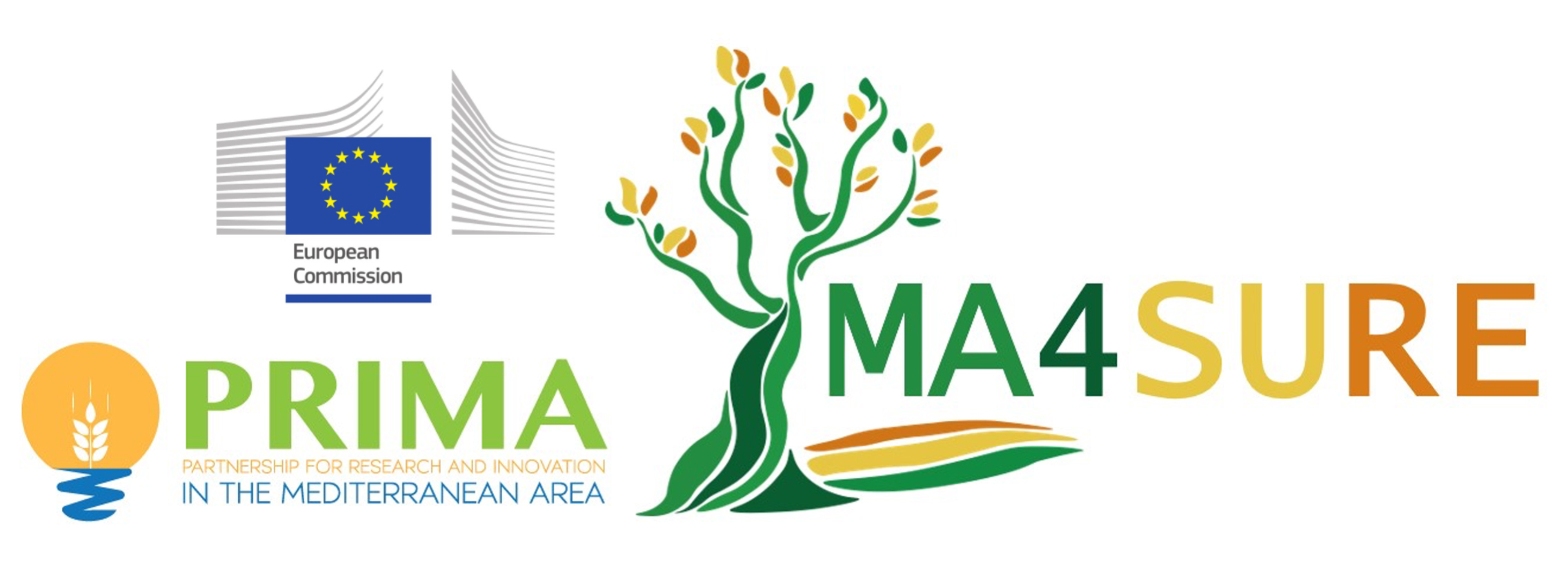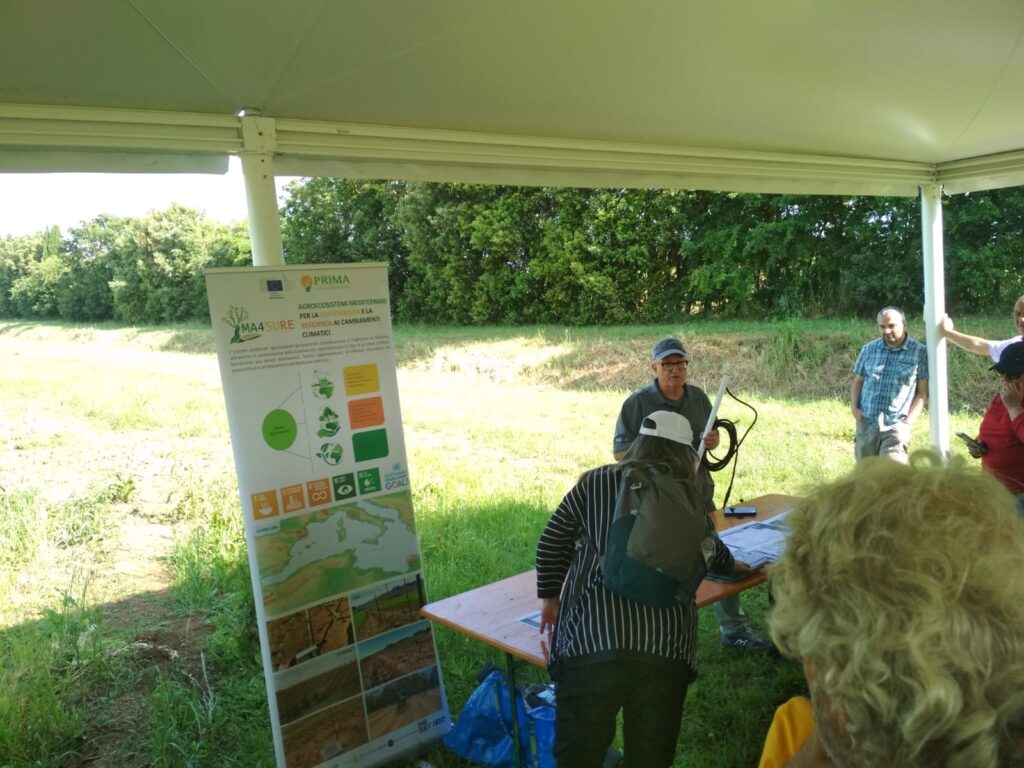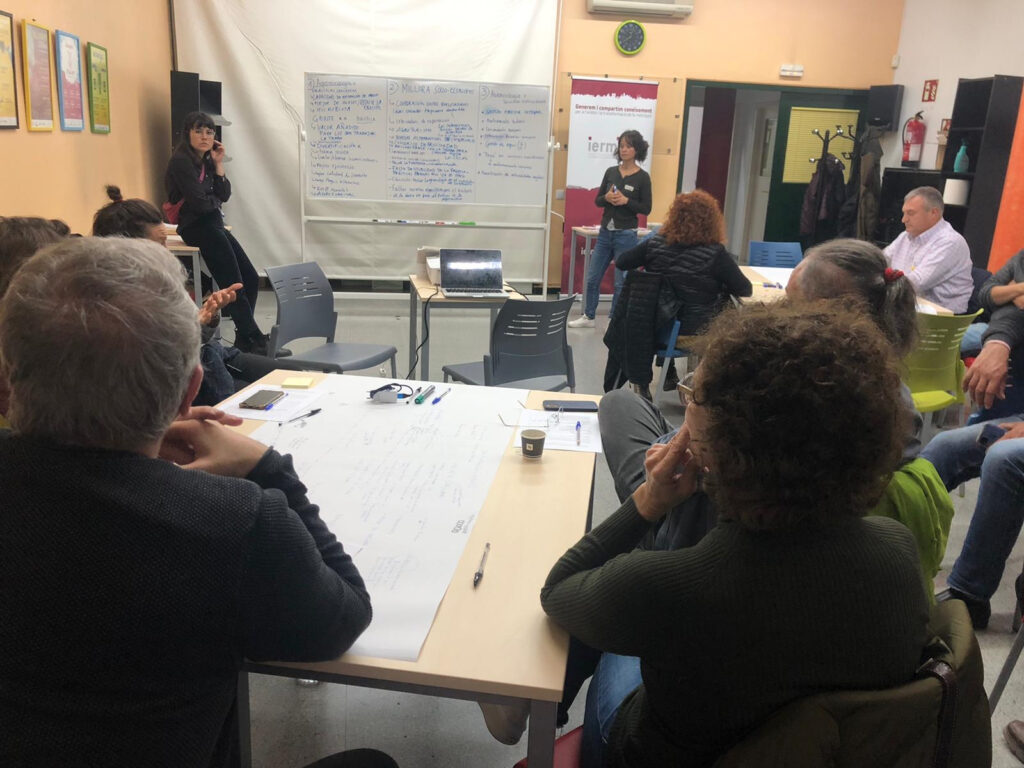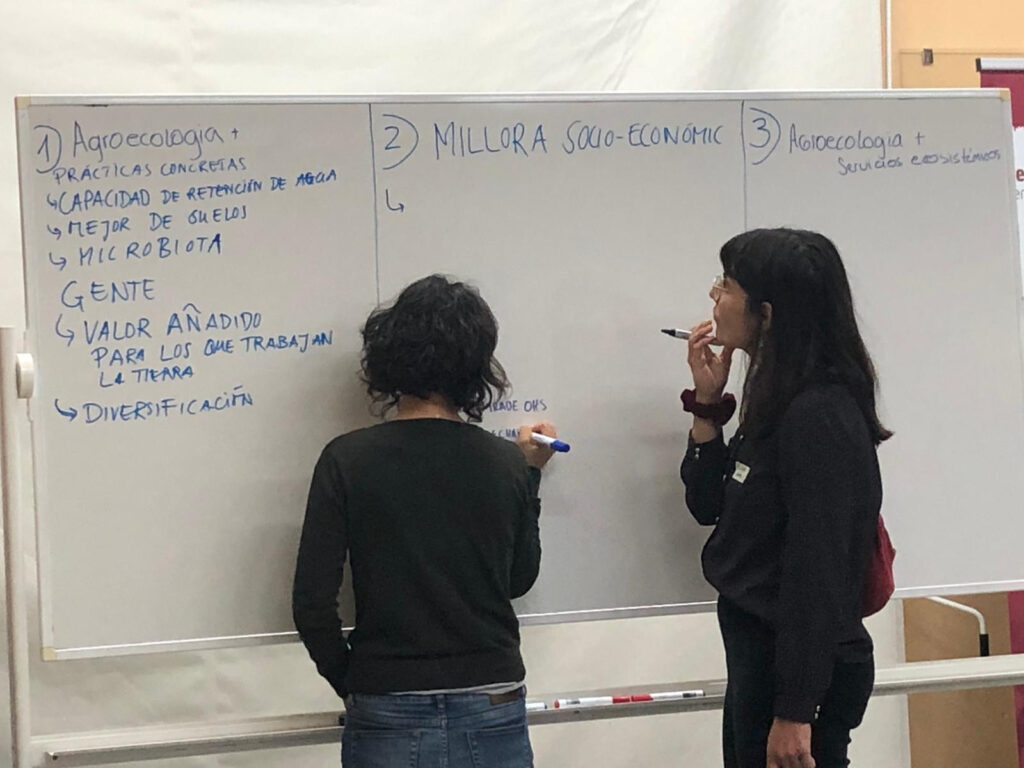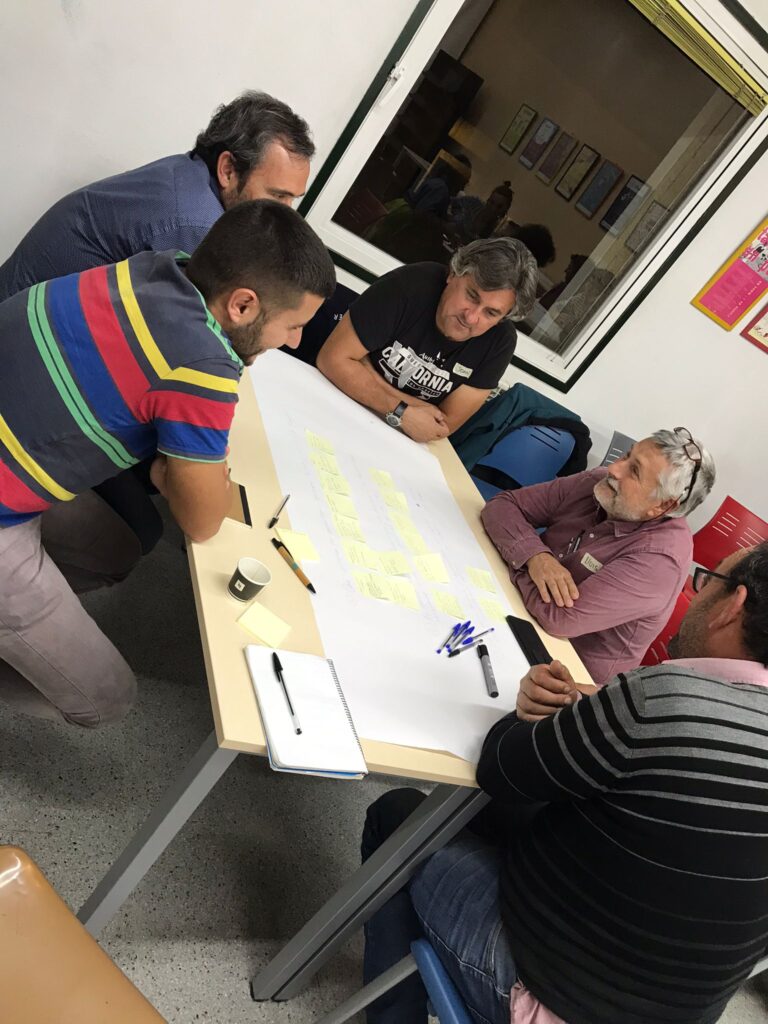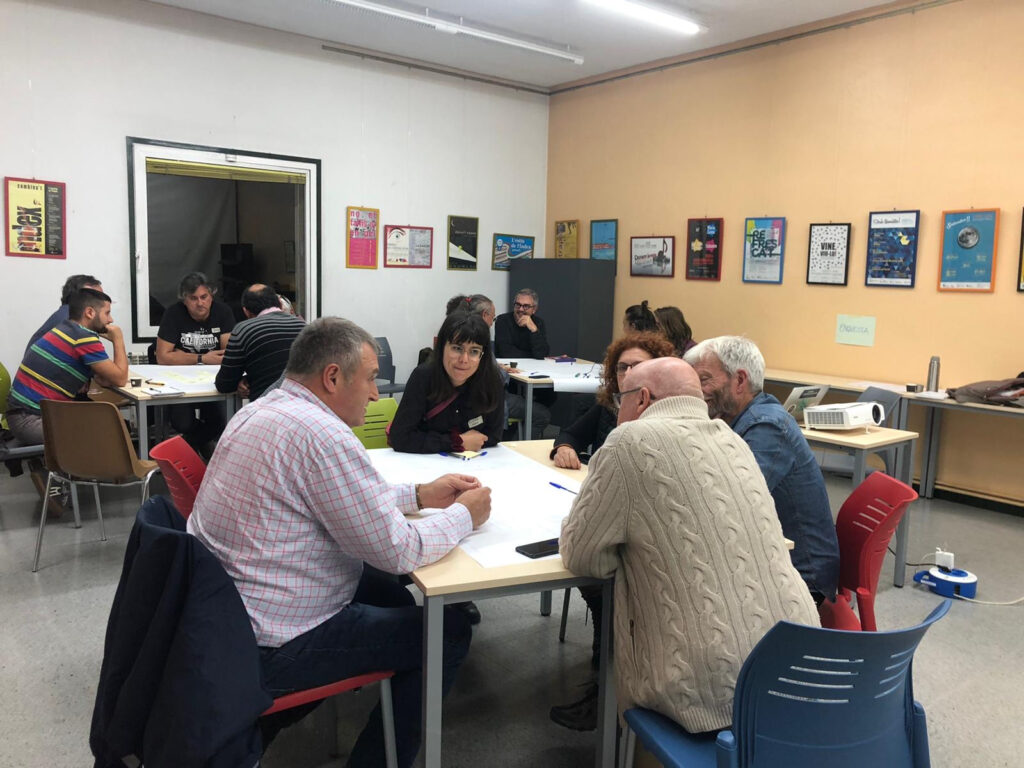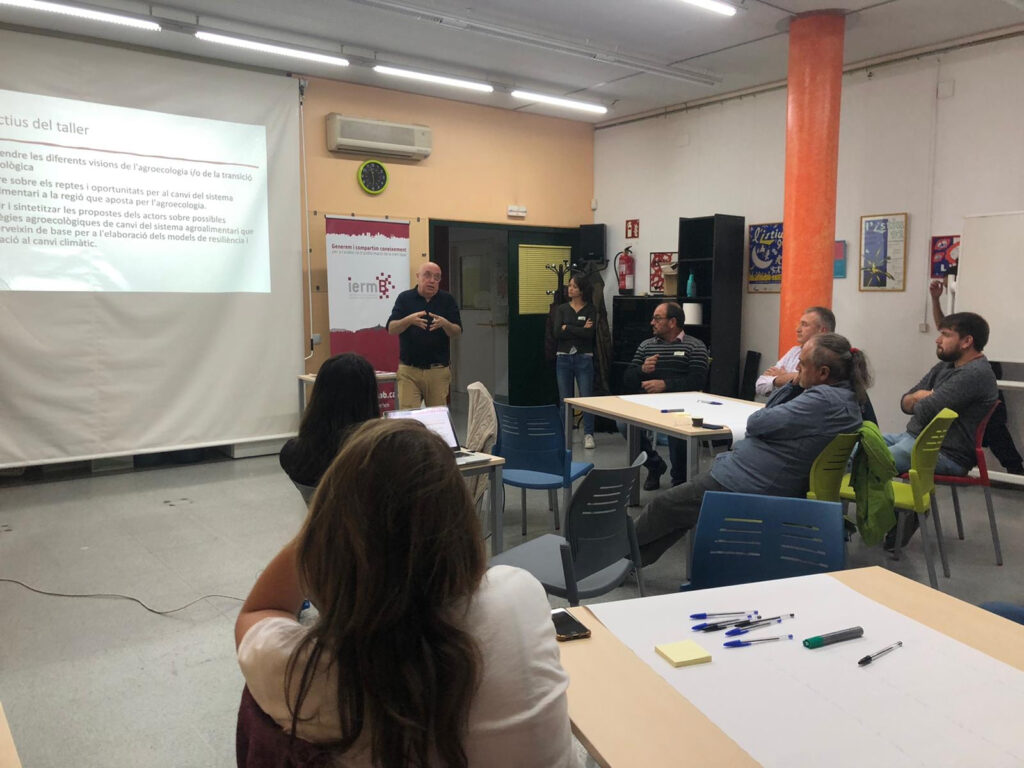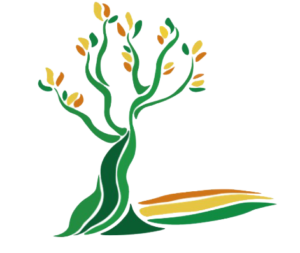Between hills and olive trees: Mid-term conference of the MA4SURE project in the Tuscany
In the hilly landscape of Tuscany, surrounded by olive groves and cornfields, the mid-term conference of the MA4SURE project hosted by the Italian partners took place on 30 and 31 May 2023. With our first planned on-site meetings having to be postponed due to the COVID19 pandemic, we were delighted to finally meet the project partners in person. The meeting was all about sharing the work accomplished so far in the different work packages (WPs), learning about the practical aspects of the Italian Living Lab and discussing the challenges, needs and opportunities for collaboration so far and in view of the last year of the project.
Getting to know the Tereto farm: the first day of the project meeting
The two days of meetings took place at the TERETO Living Lab (Tuscany, Italy) and the project consortium discussions were complemented by two guided tours through the Living Lab and the experimental plots. Parallel to the consortium meetings, the annual demo days took place at the TERETO farm. The first day was aimed at about 150 pupils from the agricultural high school of the Tuscany region, who were shown the trial field and the innovative practices (e.g., the drip irrigation system) of the TERETO Living Lab. Together with the students, a discussion took place around the cultivation practices and current challenges in farming, e.g., related to extreme weather conditions. There was also an open discussion on whether and why mechanization of olive cultivation and harvesting is necessary. Arguments in favor of mechanization included the lack of labor needed for manual harvesting and the fact that mechanical harvesting allows the fruit to be harvested at exactly the right time for ripening, thus improving the quality of the oil. Critical voices noted that mechanization is often accompanied by further intensification of agriculture, which, along with emissions from agricultural machinery, can have negative consequences in terms of climate change.
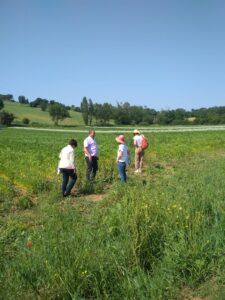
In the afternoon, the first internal meeting took place, where the leaders of the working packages presented an update of their tasks and first scientific results. Several problems that the Living Labs faced in the first years were discussed.
One of the main problems was the extreme drought, which caused changes in the soil analyses that were planned and prevented the sprouting of cover crops, which calls into question the evaluation of this agroecological practice in terms of their impact on improving soil quality. Furthermore, different experiences with practices in the experimental fields were shared, such as mulching with pine bark in the Spanish Living Lab Gramona. On part of the WP 5 on socio-political analysis, first results from the case study in Tunisia and the visit to the SEKEM Living Lab in Egypt, which took place in spring 2023, were presented (A detailed report on the field mission is available on this website in the Learning Platform section).
Exchanging with local farmers: the second day of the project meeting
The second day started with a visit to another part of the TERETO Living Lab together with different stakeholders from the region, including farmers, extension workers and agricultural associations. Several experimental plots were visited, including one where the cultivation of quinoa, a plant native to the Andean regions of Latin America, is being tested. Along with cultivation, the Tereto team is working to build the entire value chain for quinoa production to promote processing and marketing of the product directly in the region, increasing added value for farmers.
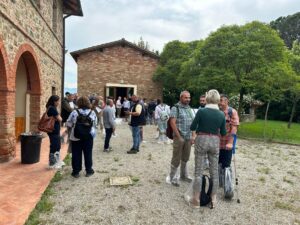
Tereto also encourages the cultivation of up to 18 different local wheat varieties selected from a pool of 100 older varieties from the region. Farmers can request the seeds directly from Tereto free of charge and thus promote the preservation of local species.
Furthermore, another project was presented in which cash crops (wheat, sunflower) are grown together with legumes to contribute to fertilisation (especially nitrogen fixation). Initial results from this project have shown that the cropping system with cover crops is able to store more soil organic carbon (SOC) in the upper soil layer and thus enrich the soil structure.
In addition to the technical visit to the plots, there were many opportunities for exchange with participants from the region. Dr. Alia Gana (WP5 leader) took the opportunity to expand the stakeholder network for the social and policy analysis in the Italian case study and was able to conduct an in-depth interview with two representatives of a local farmers association. This and the informal discussions with farmers from the regions during lunch provided a good first impression of the socio-political situation of the agricultural sector in Tuscany.
On the second afternoon, another consortium meeting took place, this time with the main aim of getting into conversation and discussing open questions and problems, for which María José La Rota (project manager of the MA4SURE project) prepared a participatory dynamic following the question: What are the main outcomes of your WP and the MA4SURE in general that you would like to see completed by April 2024?
Each consortium member was asked to note down the desired research outcomes and impacts on post-its, as well as the needs each person has and the support, they need from other WPs to achieve their own goals.
The session then moved into an open discussion where different aspects were debated. The dynamics and discussion were systematized after the meeting and provide a clear roadmap with goals, tasks, and objectives to be achieved.
The project meeting ended in the evening with a joint dinner featuring the best Italian cuisine.
Acknowledgements: What remains is a big thank you to the Italian organizing team, Dr. Cristina Vettori, Dr. Donatella Paffetti & Dr. Marco Napoli. A special thanks goes to Luigi Fabbrini and Annalena Puglisi from Tereto Farm, who guided us through these two days.
Exploring resilience and sustainability of agroecosystems in the Mediterranean
After two years of the MA4SURE project, we are pleased to share insights into our work on agroecology under climate change conditions across the Mediterranean. Learn more about our work in the Living Labs, field missions to our different study areas and first research results. Get to know stories and faces from our field studies and stakeholder activities in Spain, Egypt, and Italy. We hope you enjoy reading this newsletter!
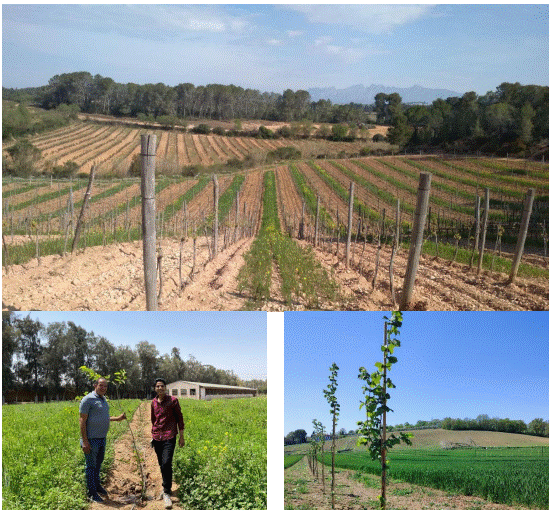
Construyendo la agroecología: Investigador@s del proyecto MA4SURE en el IX Congreso Internacional de Agroecología en Sevilla
(English versión below)
La semana pasada, investigador@s del equipo español del proyecto MA4SURE asistieron al «IX. Congreso Internacional de Agroecología. Cultivando Sistemas Alimentarios Locales de Base Agroecológica» celebrado en Sevilla, donde presentaron su investigación sobre el potencial de ampliación de proyectos agroecológicos en la región de estudio del Alt Penedès en Cataluña, España.
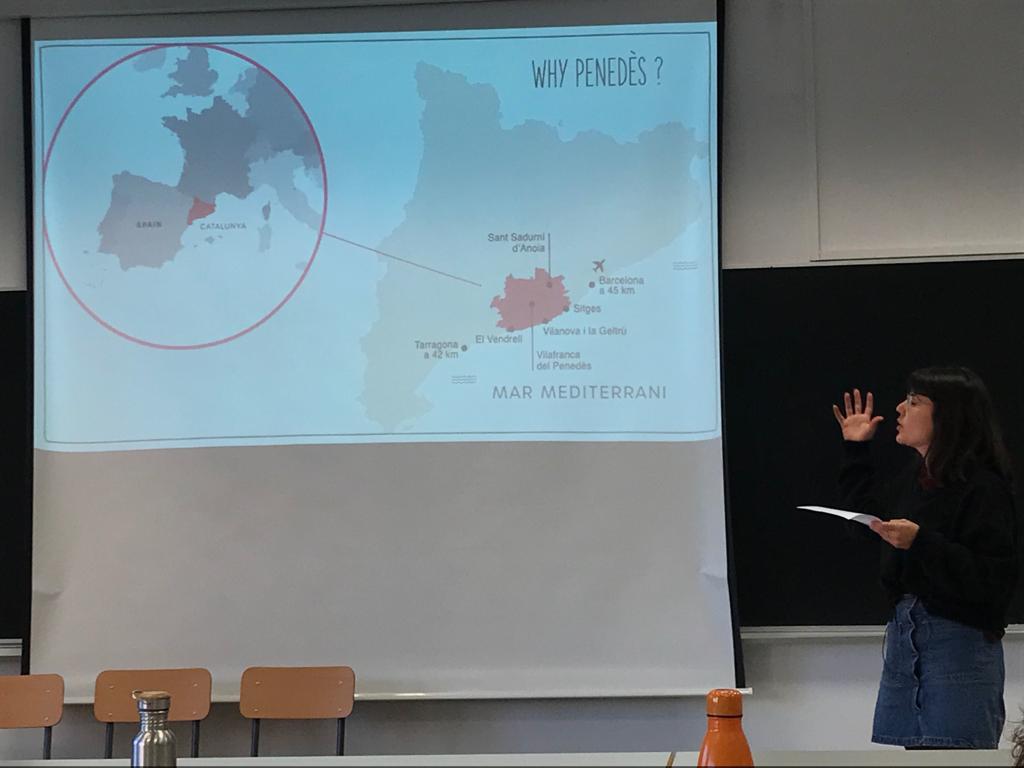
Del 19 al 21 de enero, los congresistas pasaron unos días de frío en Sevilla, donde se celebró la novena edición del Congreso Internacional de Agroecología en la Universidad Pablo de Olavide. Mientras el viento recorría los pasillos cubiertos entre los edificios universitarios, en una multitud de paneles y mesas de debate se discutían los logros, los desafíos y el diseño de un sistema agroalimentario de base agroecológica.
Temáticamente, las presentaciones de investigaciones actuales y experiencias prácticas se centraron en diferentes elementos de la transición hacia una agricultura sostenible y una alimentación sana, partiendo de la promoción de sistemas ganaderos resilientes para la provisión de servicios ecosistémicos hasta los retos demográficos del sector agrario, y cómo puede la agroecología contribuir a superar la brecha urbano-rural.
En el panel «Experiencias agroecológicas transformadoras y su potencial de ampliación», nuestra investigadora Elena Alter (Twitter @ElenaAlter) presentó el planteamiento de su investigación y resultados preliminares de su estudio sobre los retos y potencialidades de una transición agroecológica en la región del Penedès. En su trabajo, Elena aplica una metodología cualitativa principalmente de entrevistas semi-estructuradas a diversos actores territoriales, enfocándose principalmente en cuatro iniciativas ejemplares comprometidas con la agroecología, todas ubicadas en el territorio definido por la DO Penedès.
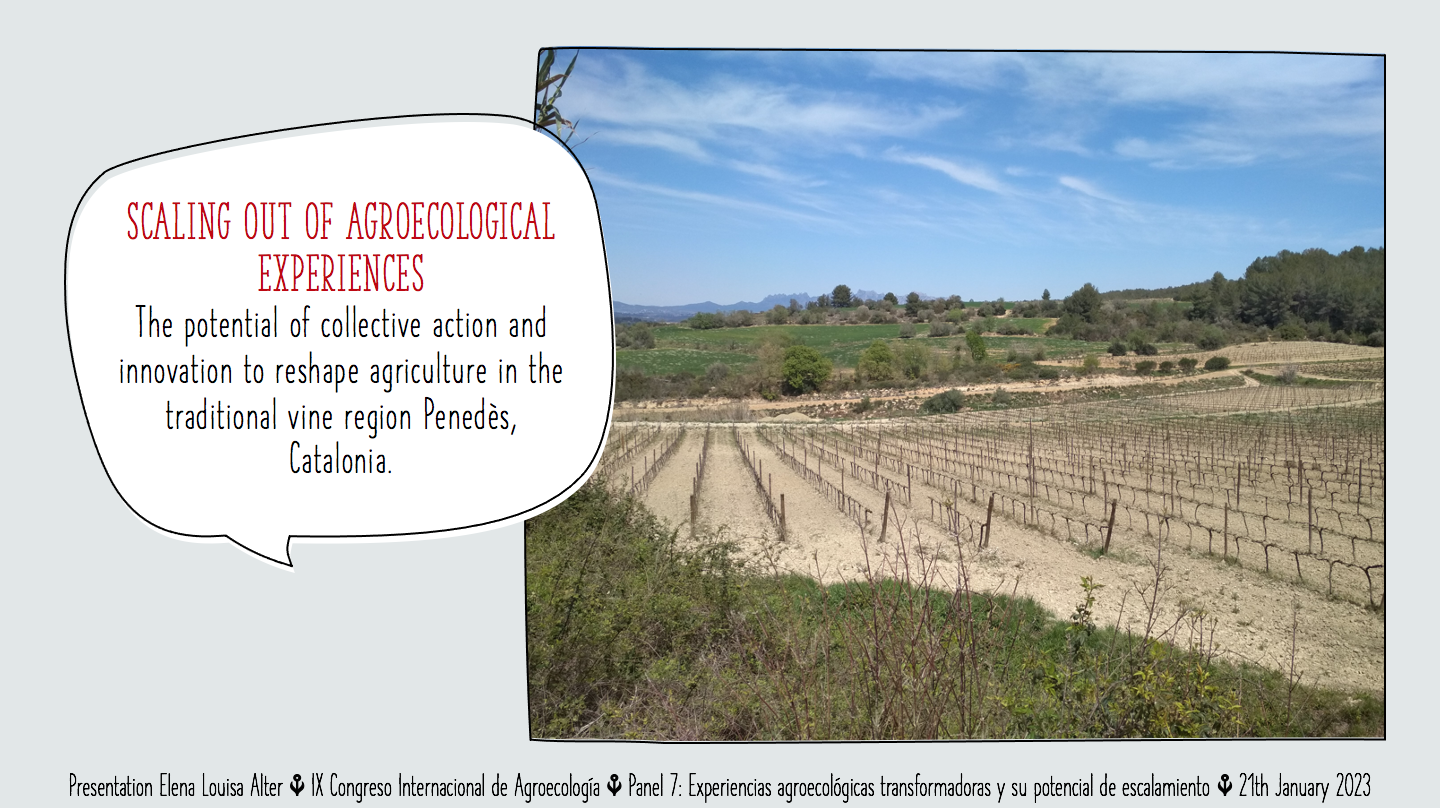
Siendo un territorio dominado por la viña, es un reto importante definir un modelo agroecológico coherente que pueda aplicarse a un monocultivo como el viñedo, con el objetivo de reconfigurar y diversificar este sistema de cultivo sin descuidar los beneficios agroclimáticos y el arraigo sociocultural que tiene en el territorio. En este sentido, las iniciativas que se encuentran en diferentes puntos de la transición agroecológica pueden darnos valiosas perspectivas sobre cómo avanzar en este camino. Algunas están centradas en la aplicación de prácticas agroecológicas para mejorar el funcionamiento ecológico de sus explotaciones (por ejemplo, prácticas de agroforestería, diversificación de producción, mulching y compost), otras están más enfocadas en la dimensión socioeconómica de la agroecología, por ejemplo, basándose en modelos cooperativos para dar respuesta a los problemas relacionados con la falta de relacionamiento entre consumidores y productores o con el relevo generacional.
Basado en dos pilares teóricos, el escalamiento agroecológico y la acción e innovación social colectiva, los resultados preliminares de la investigadora revelan que son diferentes factores los que juegan un papel importante para que este tipo de iniciativas surjan, se desarrollen y se extiendan por el territorio. Por ejemplo, el surgimiento de muchas de estas iniciativas se puede relacionar con la presencia de situaciones de crisis (por ejemplo, bajos precios agrícolas o la falta de relevo generacional), las cuales impulsan un cambio del modelo productivo y/o distributivo de las explotaciones agrarias en un territorio. Así mismo, la presencia de liderazgos definidos por uno o varios de los agentes innovadores y la búsqueda de aliados, son factores que refuerzan estas iniciativas. “Un punto clave para el desarrollo de las iniciativas a largo plazo y la expansión de sus actividades en el territorio- y que mencionaron todos actores que fueron entrevistados hasta ahora- es la cohesión del grupo. La creación de relaciones emocionales fuertes dentro del grupo, mediante reuniones informales, eventos y aprendizaje mutuo se reflejó en afirmaciones como ‘creamos una familia’”, destaca Elena.
Mientras la investigación de Elena y del resto del equipo del proyecto MA4SURE continúa, todos salimos del congreso el sábado por la tarde inspirados por los trabajos de investigación de destacados investigadores en agroecología como Michel Pimbert y Clara Nicholls y los debates con participantes de todo el mundo.
English Version
Building agroecology: Researchers from the MA4SURE project at the IX International Agroecology Congress in Seville
Last week, researchers from the Spanish MA4SURE project team attended the «IX. International Congress of Agroecology. Cultivating Agroecologically Based Local Food Systems» held in Seville, where they presented their research on the potential for scaling up agroecological projects in the study region of Alt Penedès in Catalonia, Spain.

From 19 to 21 January, the congress participants spent a few cold days in Seville, where the ninth edition of the International Agroecology Congress was held at the Pablo de Olavide University. While the wind blew through the roofed corridors between the university buildings, a multitude of panels and round tables discussed the achievements, challenges and design of an agroecologically based agri-food system.
Thematically, presentations of current research and practical experiences focused on different aspects of the transition to sustainable agriculture and healthy food, ranging from the promotion of resilient livestock systems for the provision of ecosystem services to the demographic challenges of the agricultural sector, and how agroecology can contribute to bridging the urban-rural divide.
In the panel «Transformative agroecological experiences and their potential for scaling up», our researcher Elena Alter (Twitter @ElenaAlter) presented her research approach and preliminary results of her study on the challenges and potentials of an agroecological transition in the Penedès region. In her work, Elena applies a qualitative methodology based primarily on semi-structured interviews with various territorial actors, focusing on four exemplary initiatives committed to agroecology, all of which are located in the territory defined by the DO Penedès.
Being a territory dominated by vineyards, it is an important challenge to define a coherent agroecological model that can be applied to a monoculture such as vineyards, with the aim of reconfiguring and diversifying this cultivation system without neglecting the agroclimatic benefits and the socio-cultural roots it has in the territory. In this sense, initiatives at different points in the agroecological transition can provide valuable insights on how to move forward along this path. Some are focused on the application of agroecological practices to improve the ecological functioning of their farms (e.g. agroforestry practices, diversification of production, mulching and composting), others are more focused on the socio-economic dimension of agroecology, for example, relying on cooperative models to respond to problems related to the lack of relationships between consumers and producers or to generational renewal.

Based on two theoretical pillars, agroecological scaling and collective social action and innovation, the researcher’s preliminary results reveal that different factors play an important role in the emergence, development and spread of this type of initiative in the territory. For example, the emergence of many of these initiatives can be related to the presence of crisis situations (for example, low agricultural prices or the lack of generational replacement), which drive a change in the productive and/or distributive model of farms in a territory. Likewise, the presence of leadership defined by one or more innovative agents and the search for allies are factors that reinforce these initiatives. «A key point for the development of long-term initiatives and the expansion of their activities in the territory – a point mentioned by all the actors interviewed so far – is the cohesion of the group. The creation of strong emotional relationships within the group, through informal meetings, events and mutual learning was reflected in statements such as ‘we created a family’,» Elena highlights.
While Elena’s research and that of the rest of the MA4SURE project team continues, we all left the conference on Saturday afternoon inspired by the research work of leading agroecology researchers such as Michel Pimbert and Clara Nicholls and the discussions with participants from around the world.
Construyendo la agroecología: Investigador@s del proyecto MA4SURE en el IX Congreso Internacional de Agroecología en Sevilla
(English versión below)
La semana pasada, investigador@s del equipo español del proyecto MA4SURE asistieron al «IX. Congreso Internacional de Agroecología. Cultivando Sistemas Alimentarios Locales de Base Agroecológica» celebrado en Sevilla, donde presentaron su investigación sobre el potencial de ampliación de proyectos agroecológicos en la región de estudio del Alt Penedès en Cataluña, España.

Del 19 al 21 de enero, los congresistas pasaron unos días de frío en Sevilla, donde se celebró la novena edición del Congreso Internacional de Agroecología en la Universidad Pablo de Olavide. Mientras el viento recorría los pasillos cubiertos entre los edificios universitarios, en una multitud de paneles y mesas de debate se discutían los logros, los desafíos y el diseño de un sistema agroalimentario de base agroecológica.
Temáticamente, las presentaciones de investigaciones actuales y experiencias prácticas se centraron en diferentes elementos de la transición hacia una agricultura sostenible y una alimentación sana, partiendo de la promoción de sistemas ganaderos resilientes para la provisión de servicios ecosistémicos hasta los retos demográficos del sector agrario, y cómo puede la agroecología contribuir a superar la brecha urbano-rural.
En el panel «Experiencias agroecológicas transformadoras y su potencial de ampliación», nuestra investigadora Elena Alter (Twitter @ElenaAlter) presentó el planteamiento de su investigación y resultados preliminares de su estudio sobre los retos y potencialidades de una transición agroecológica en la región del Penedès. En su trabajo, Elena aplica una metodología cualitativa principalmente de entrevistas semi-estructuradas a diversos actores territoriales, enfocándose principalmente en cuatro iniciativas ejemplares comprometidas con la agroecología, todas ubicadas en el territorio definido por la DO Penedès.

Siendo un territorio dominado por la viña, es un reto importante definir un modelo agroecológico coherente que pueda aplicarse a un monocultivo como el viñedo, con el objetivo de reconfigurar y diversificar este sistema de cultivo sin descuidar los beneficios agroclimáticos y el arraigo sociocultural que tiene en el territorio. En este sentido, las iniciativas que se encuentran en diferentes puntos de la transición agroecológica pueden darnos valiosas perspectivas sobre cómo avanzar en este camino. Algunas están centradas en la aplicación de prácticas agroecológicas para mejorar el funcionamiento ecológico de sus explotaciones (por ejemplo, prácticas de agroforestería, diversificación de producción, mulching y compost), otras están más enfocadas en la dimensión socioeconómica de la agroecología, por ejemplo, basándose en modelos cooperativos para dar respuesta a los problemas relacionados con la falta de relacionamiento entre consumidores y productores o con el relevo generacional.
Basado en dos pilares teóricos, el escalamiento agroecológico y la acción e innovación social colectiva, los resultados preliminares de la investigadora revelan que son diferentes factores los que juegan un papel importante para que este tipo de iniciativas surjan, se desarrollen y se extiendan por el territorio. Por ejemplo, el surgimiento de muchas de estas iniciativas se puede relacionar con la presencia de situaciones de crisis (por ejemplo, bajos precios agrícolas o la falta de relevo generacional), las cuales impulsan un cambio del modelo productivo y/o distributivo de las explotaciones agrarias en un territorio. Así mismo, la presencia de liderazgos definidos por uno o varios de los agentes innovadores y la búsqueda de aliados, son factores que refuerzan estas iniciativas. “Un punto clave para el desarrollo de las iniciativas a largo plazo y la expansión de sus actividades en el territorio- y que mencionaron todos actores que fueron entrevistados hasta ahora- es la cohesión del grupo. La creación de relaciones emocionales fuertes dentro del grupo, mediante reuniones informales, eventos y aprendizaje mutuo se reflejó en afirmaciones como ‘creamos una familia’”, destaca Elena.
Mientras la investigación de Elena y del resto del equipo del proyecto MA4SURE continúa, todos salimos del congreso el sábado por la tarde inspirados por los trabajos de investigación de destacados investigadores en agroecología como Michel Pimbert y Clara Nicholls y los debates con participantes de todo el mundo.
English Version
Building agroecology: Researchers from the MA4SURE project at the IX International Agroecology Congress in Seville
Last week, researchers from the Spanish MA4SURE project team attended the «IX. International Congress of Agroecology. Cultivating Agroecologically Based Local Food Systems» held in Seville, where they presented their research on the potential for scaling up agroecological projects in the study region of Alt Penedès in Catalonia, Spain.

From 19 to 21 January, the congress participants spent a few cold days in Seville, where the ninth edition of the International Agroecology Congress was held at the Pablo de Olavide University. While the wind blew through the roofed corridors between the university buildings, a multitude of panels and round tables discussed the achievements, challenges and design of an agroecologically based agri-food system.
Thematically, presentations of current research and practical experiences focused on different aspects of the transition to sustainable agriculture and healthy food, ranging from the promotion of resilient livestock systems for the provision of ecosystem services to the demographic challenges of the agricultural sector, and how agroecology can contribute to bridging the urban-rural divide.
In the panel «Transformative agroecological experiences and their potential for scaling up», our researcher Elena Alter (Twitter @ElenaAlter) presented her research approach and preliminary results of her study on the challenges and potentials of an agroecological transition in the Penedès region. In her work, Elena applies a qualitative methodology based primarily on semi-structured interviews with various territorial actors, focusing on four exemplary initiatives committed to agroecology, all of which are located in the territory defined by the DO Penedès.
Being a territory dominated by vineyards, it is an important challenge to define a coherent agroecological model that can be applied to a monoculture such as vineyards, with the aim of reconfiguring and diversifying this cultivation system without neglecting the agroclimatic benefits and the socio-cultural roots it has in the territory. In this sense, initiatives at different points in the agroecological transition can provide valuable insights on how to move forward along this path. Some are focused on the application of agroecological practices to improve the ecological functioning of their farms (e.g. agroforestry practices, diversification of production, mulching and composting), others are more focused on the socio-economic dimension of agroecology, for example, relying on cooperative models to respond to problems related to the lack of relationships between consumers and producers or to generational renewal.

Based on two theoretical pillars, agroecological scaling and collective social action and innovation, the researcher’s preliminary results reveal that different factors play an important role in the emergence, development and spread of this type of initiative in the territory. For example, the emergence of many of these initiatives can be related to the presence of crisis situations (for example, low agricultural prices or the lack of generational replacement), which drive a change in the productive and/or distributive model of farms in a territory. Likewise, the presence of leadership defined by one or more innovative agents and the search for allies are factors that reinforce these initiatives. «A key point for the development of long-term initiatives and the expansion of their activities in the territory – a point mentioned by all the actors interviewed so far – is the cohesion of the group. The creation of strong emotional relationships within the group, through informal meetings, events and mutual learning was reflected in statements such as ‘we created a family’,» Elena highlights.
While Elena’s research and that of the rest of the MA4SURE project team continues, we all left the conference on Saturday afternoon inspired by the research work of leading agroecology researchers such as Michel Pimbert and Clara Nicholls and the discussions with participants from around the world.
«L’agroecologia és una forma de vida!» Conclusions del primer taller d’actors locals en el cas d’estudi català del projecte MASURE
(English version below)
En base a la pregunta «Pot ser la comarca de l’Alt Penedès pionera en la transició agroecològica?», la setmana passada es va celebrar el primer taller participatiu amb actors locals sobre el nostre cas d’estudi a Catalunya (comarca de l’Alt Penedès).
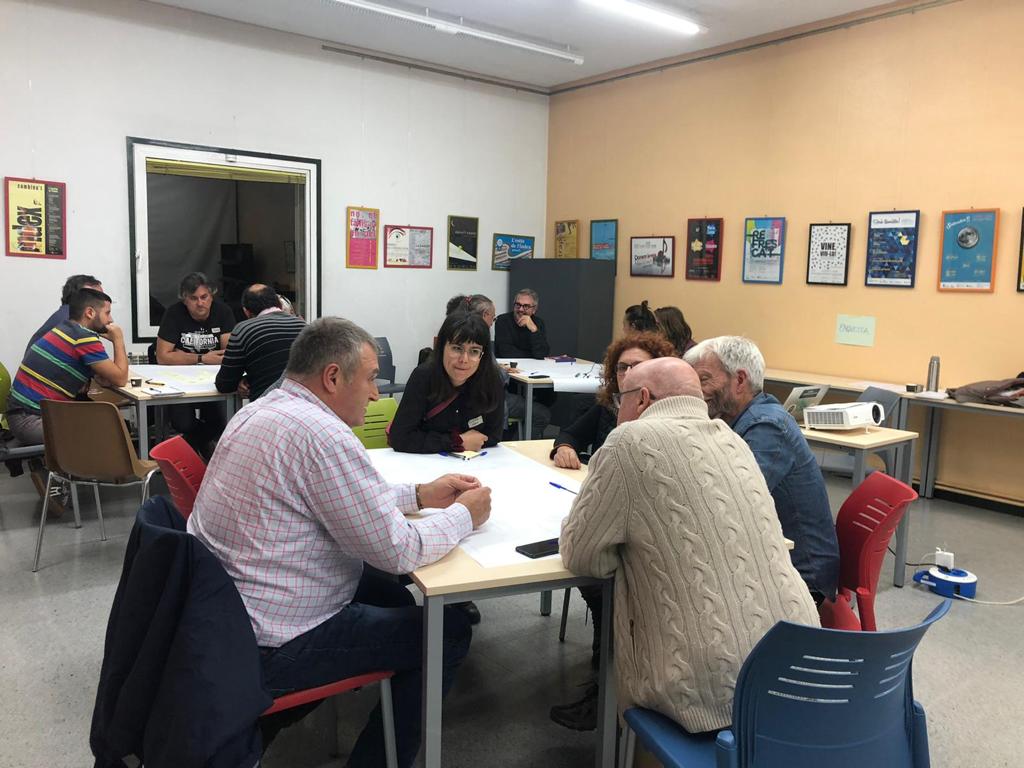
En la localitat de Sant Sadurní d’Anoia vam tenir el plaer de rebre el passat dijous 17 de novembre a 15 actors de la comunitat agrícola i l’administració local. En un animat intercanvi, es van debatre els reptes i les potencialitats d’una transició agroecològica a l’Alt Penedès, que ja és capdavantera en viticultura ecològica.
Entorn de les tres preguntes següents, els participants van compartir les seves experiències i coneixements:
- Què s’entén per agroecologia i quin paper pot jugar l’Alt Penedès en la promoció de l’agricultura ecològica a Catalunya?
- En quina mesura l’agroecologia pot contribuir a millorar els rendiment econòmics i la qualitat de vida?
- Com pot contribuir l’agroecologia a millorar els serveis ecosistèmics que proporciona l’agricultura de l’Alt Penedès?
L’intercanvi va ser molt fructífer per a tots ja que, encara que molts dels assistents comparteixen el mateix territori, es van aportar diferents perspectives sobre les dinàmiques territorials de l’Alt Penedès i les experiències en els models de negoci i l’agricultura.
Una primera visió dels resultats del taller va mostrar que, encara que el terme ‘agroecologia’ no sol utilitzar-se activament, els actors tenen una visió diferenciada d’aquest terme i els seus possibles beneficis.
Des del punt de vista socioecològic, implica l’aplicació de pràctiques concretes en el camp que poden ajudar a augmentar la capacitat de retenció d’aigua, la millora de les condicions del sòl i la reducció de l’erosió, així com la conservació de la biodiversitat. Per aconseguir-ho, l’agroecologia advoca per millorar l’eficiència dels tractaments en el camp, diversificar la producció, limitar/eliminar els inputs externs no renovables, aplicar mètodes alternatius de gestió de plagues i incloure una gestió agroforestal integrada.
Des del punt de vista socioeconòmic, les parts interessades van definir l’agroecologia com un model que hauria de situar a les persones en el centre del sistema agroalimentari i que, per tant, es percep com una «forma de vida». Això últim implica la valoració dels qui treballen la terra, per exemple mitjançant el pagament de preus justos. També es va associar l’agroecologia a un model de producció i comercialització de proximitat, que implica una relació més directa amb els consumidors.
No obstant això, durant el debat van sorgir molts reptes per a la promoció de l’agroecologia a l’Alt Penedès, que el projecte MA4SURE continuarà analitzant amb més profunditat.
L’objectiu del projecte és continuar el treball participatiu amb els actors locals i desenvolupar un document estratègic (en forma de «decàleg») que contingui les demandes i propostes concretes que es facin des del territori per a la promoció de l’agroecologia.
Estigues al dia sobre els treballs que estem fent en el projecte MA4SURE i totes les activitats participatives amb actors locals que estem duent a terme. Aviat tindreu notícies en aquest mateix espai.
(English version)
«Agroecology is a way of life!» Insights from the first local stakeholder workshop in the Spanish case study of the MASURE project
Under the question «Can the Alt Penedès County be a flagship in the transition towards agroecology?», we successfully held our first participatory stakeholder workshop last week in our Spanish case study in Catalonia (Alt Penedès region).

In the town of Sant Sadurní d’Anoia, about 40 minutes by train from Barcelona, we were pleased to welcome 15 regional stakeholders from the farming community, farmers’ organisations and the local administration, last Thursday afternoon, November 17th . In a lively exchange, we discussed potentials and challenges of an agroecological transition of the region, which is already a pioneer in organic viticulture.
Along the following three questions, participants shared their experiences and knowledge:
- What do you understand by agroecology and what role can the Alt Penedès play in promoting agroecology in Catalonia?
- To what extent can agroecology contribute to improving economic performance and quality of life?
- To what extent can agroecology contribute to improving the ecosystem services provided by agriculture in the Alt Penedès?
The exchange was very fruitful for everyone since, even many share the same territory, guests provided different perspectives on regional dynamics and experiences with business and farming models.
A first insight into the results of the workshop shows that even though the term agroecology is often not actively used, the participants have a very differentiated view on agroecology and its possible benefits.
Accordingly, agroecology encompasses different characteristics that can be divided into an ecological and a socio-economic dimension.
From an ecological point of view, it implies applying concrete practices in the field that help to increase (1) water retention capacity, (2) improvement of soil conditions and reduced erosion, as well as (3) presence of micro biota in the soil.
To achieve this, agroecology advocates for (1) improved efficiency of field treatments, (2) diversification of production, (3) limiting/eliminating external inputs, (4) applying alternative pest management methods and (5) including integrated agroforestry management.
From a socio-economic point of view, stakeholders defined agroecology as a model that puts people at the center of the agri-food system and is therefore perceived as a «way of life». The latter involves valuing those who work the land, both symbolically and economically, for instance through the payment of fair prices. It was also associated with a model of proximity production and marketing that implies a more direct relationship with consumers.
However, during the discussion many challenges for the promotion of agroecology in the region came up, which we now will analyse in more depth.
Our aim is to continue our participatory work with local stakeholders and to develop a strategy paper (in the form of a «decalogue») containing concrete demands and proposals from the region for the promotion of agroecology at the territorial level.
Stay up to date on our work within the MA4SURE project and the stakeholder engagement activities we are carrying out. We will publish news here in the coming months.
Events
Taller participatiu: "La transició agroecològica davant del canvi climàtic. Podria ser la comarca de l’Alt Penedès pionera?" Inscriu-te aquí
17/11/2022 - 5:30 pm
Edifici Índex C/ Pompeu Fabra 34, 1r pis 08770 Sant Sadurní d'Anoia
